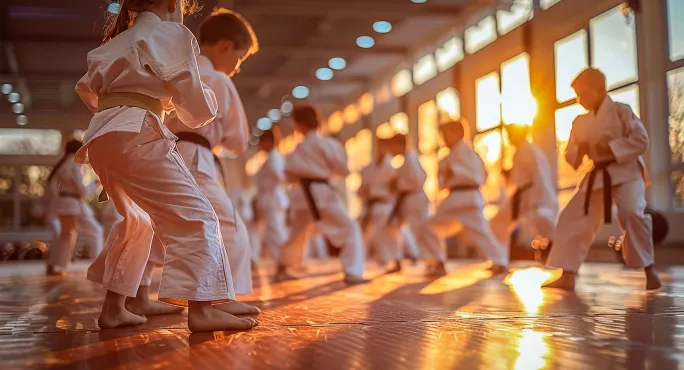- Home
- Teaching & Learning
- Secondary
- How karate kicked off something special at our school
How karate kicked off something special at our school

One of the most important tasks for any newly appointed headteacher is getting to know the local community.
Understanding the social, economic and cultural context of a learning community helps to shape approaches and interventions. Effective local partnerships ensure long-term school improvement; in simpler terms, it takes a village to raise a child.
Every place has numerous community assets, if you take time to look. The trick is getting to know these groups and individuals to explore how they can help to enhance what we do in school.
So it was that in 2021, as new headteacher at Morgan Academy in Dundee, I became aware of Kanzen Karate, just around the corner from the school. After an hour in the company of chief officer Roy O’Kane, the shared goals of our organisations were clear - and the opportunities for collaboration and partnership obvious and exciting.
While I knew next to nothing about martial arts, two things were immediately obvious.
More than a sports club
Firstly, Kanzen wasn’t just a run-of-the-mill community sports club. Secondly, it offered much more than karate to its many members: its vision statement focuses on the enrichment of wellbeing and educational advancement, with karate the cornerstone activity.
This is a community club for all, but equally boasts numerous national and international champions. It also helped to bring a global karate competition to Dundee in 2018, contributing an estimated £9.7 million to the local economy.
In short, it had lots to offer young people.
- Exclusive: Review is ‘evolving CfE, not ripping it up’
- Also this week: What should we call the people that teachers teach?
- Long read: Where in Scotland do all pupils receive mobile devices?
Most of Morgan Academy’s 1,000 students live locally. It was possible for some to walk to the club dojo in five minutes and benefit from outstanding experiences at the club - yet none did so.
There were lots of possible reasons, but deprivation was certainly one. According to research from the University of Stirling’s Professor Tess Kay and the Observatory of Sport in Scotland, participation in sport depends largely on family income - and at Morgan Academy nearly 60 per cent of learners resided in datazones classified as most disadvantaged by the Scottish Index of Multiple Deprivation in 2020.
As a PE teacher, I need no persuasion as to the many benefits of learning through organised and regular sport. Aside from the social and wellbeing benefits, students try new skills, develop initiative and positive habits, improve communication and build resilience. This can help them to cope and thrive when dealing with change, as well as helping them to map out their future lives.
Following taster sessions for all S1s, we created a group of 20 to participate in karate through Kanzen, three times a week, as part of their formal S2 curriculum. None had previous karate experience; one key aspect was free access to Kanzen’s evening and weekend classes.
Long-term impact
Fast forward two years and our first cohort is now in S4. Around half the S2 participants chose to continue with karate through S3, achieving a qualification in National 4 PE, with karate the specified practical activity. These students are progressing well, with some taking their karate skills into S4 qualifications within senior-phase PE courses.
A range of skills is covered though the programme, including communication, initiative and resilience. Learners are challenged to be increasingly self-aware and to better regulate themselves. They feed back that the programme has made them healthier, made them challenge themselves, improved their self-confidence, helped them to reduce anxiety and helped them to learn new skills.
Around a quarter of the initial cohort now regularly attends Kanzen evening and weekend classes and participate in competitive events, while some flourish by volunteering at the club in their spare time. This experience can feed into other aspects of their school lives, with improved attendance, focus and ambition around their studies. Karate is helping many of our young people to exceed their own expectations.
We have now launched a high-performance karate school, open to learners across the country. Students will have access in school time to personalised training programmes, to achieve success in karate at local, national and international levels.
Our initial intake in August was six students, including some national champions. Through this programme, we believe students will better manage the demands of school and high-performance sport - and succeed in both.
Like schools that host high-performance sport programmes in football, rugby and dance, we know that the inclusion of this group will very much be an asset to our school community, helping us to raise the bar for all of our learners.
Johnny Lothian is headteacher of Morgan Academy in Dundee but will shortly take up the role of campus leader and head of the new East End Community Campus, also in Dundee. He tweets @JohnnyLothian
For the latest in Scottish education delivered directly to your inbox, sign up for Tes’ The Week in Scotland newsletter
Keep reading for just £1 per month
You've reached your limit of free articles this month. Subscribe for £1 per month for three months and get:
- Unlimited access to all Tes magazine content
- Exclusive subscriber-only stories
- Award-winning email newsletters
topics in this article



